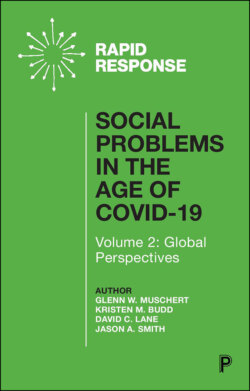Читать книгу Social Problems in the Age of COVID-19 Vol 2 - Группа авторов - Страница 22
На сайте Литреса книга снята с продажи.
The Problem
ОглавлениеThe COVID-19 pandemic has jeopardized the successful transition to adulthood for many youth around the world. The present health and economic crisis has diminished youth’s capacity to acquire key adult markers, including finishing school, the acquisition of stable employment, obtaining an independent residence, marriage, and parenthood. Due to significant and widespread disruptions stemming from the pandemic, youth have become increasingly vulnerable at a critical life stage. Inequalities in the transition to adulthood, already problematic before the pandemic, have deepened. However, the impacts of COVID-19 on youth are not uniform across countries; they depend largely on national institutional arrangements and social policy. This chapter addresses the implications of COVID-19 and its aftermath for educational, employment, and family-related transitions to adulthood.
The economic downturn and uncertainty induced by the pandemic have resulted in wide-ranging effects on postsecondary education and training, from the availability of public funding for these programs to their affordability. Unemployment and reductions in work hours have lessened families’ capacity to pay for their children’s tuition and other educational costs. Moreover, in some countries, for the first time in the history of higher education, attendance may be a health risk that could discourage enrollment and completion. In this context, youth may lower their educational aspirations, have increasing difficulty obtaining postsecondary educational degrees, and/or drop out due to lack of resources. These problems could exacerbate preexisting racial and class inequalities in educational outcomes, leading to increasingly divergent socioeconomic opportunities both within and between countries.
Similarly, the COVID-19 pandemic has jeopardized young people’s successful entry to, and establishment in, the workforce. Long-term structural changes and increased global competition have made work uncertain and unstable, especially for young adults entering the job market. The pandemic has worsened this problem and is likely to widen occupational and income inequalities. The lack of institutional bridges from school to work in some countries, such as the United States, China, and Brazil, makes job entry particularly challenging, even in good economic times. As labor markets tighten in such countries during this pandemic, youth have experienced mounting unemployment from which they will struggle to fully recover even when economic conditions improve. Young adults who are unemployed during the pandemic will likely experience long-term disadvantage in the labor market, as they compete with new workforce entrants without extensive unemployment gaps in their résumés. Furthermore, obtaining full-time work and financial stability are generally prerequisites for leaving home, marriage, and parenthood. COVID-19 has disrupted family formation, as many young adults return to live with their families of origin. It has also diminished the likelihood that youth will become homeowners at the same age as their parents’ generation, thereby decreasing their future accumulations of wealth.
In short, many young adults have experienced monumental difficulties due to the pandemic at a time when their choices and behaviors in multiple spheres will be highly consequential for their future life trajectories.
